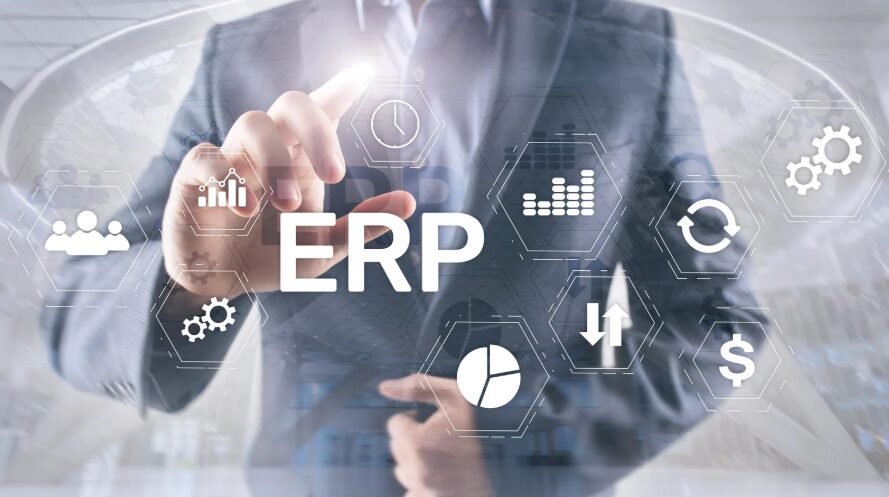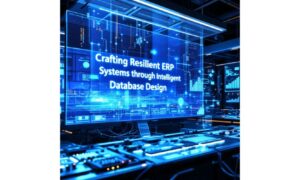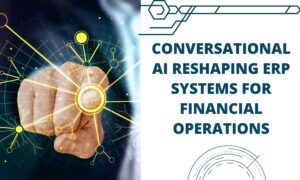We have updated our list of the top ERP systems for Manufacturing in 2025 to make your search for a leading ERP system easier and less stressful.
Our picks come from careful, independent research. We don’t accept payment to include systems on this list. Instead, we’ve chosen ERPs that we have seen prove themselves across different industries and company sizes.
This isn’t a typical “best to worst” ranking. Every business is unique, so there’s no universal best choice. Each system here has met our high standards and shown real-world success.
We’ll break down each system’s key features. Then, you can use our methodology to narrow the options or find others that might better suit your needs.
Check out the methodology at the end of the article for insight into the selection process. We use a thorough method to ensure that our recommendations align with your business goals and offer room for growth.
Let’s explore the ERP systems that are making waves in 2025.
What is Enterprise Resource Planning?
At its core, ERP is an application that automates business processes and provides insights and internal controls, drawing on a central database that collects inputs from departments including accounting, manufacturing, supply chain management, sales, marketing and human resources (HR).
Every business must complete work that requires numerous stakeholders with various responsibilities. But that’s a struggle when the information needed to execute processes and make key decisions is spread across disconnected systems. Whether data is held in basic business management software or spreadsheets, employees have a hard time finding what they need and may lack access to it entirely. For example, the accounting and FP&A teams could each have different spreadsheets with different figures for expense tracking.
These disparate data sources make it very challenging to keep everyone on the same page and hinders collaboration and efficiency, especially as an organisation grows. Staff waste time hunting for documents and potentially duplicating work because there is no one place to look for up-to-date information on all aspects of the business relevant to them. This also makes it difficult to see the full cause and effect of developments affecting your business.
An ERP system solves this problem by compiling information in a central database to grant managers and employees cross-departmental visibility, making it an effective form of resource planning software. It also eliminates the problems that come with conflicting sources of data and empowers them to analyse various scenarios, discover process improvements and generate major efficiency gains. That translates to cost savings and better productivity as people spend less time digging for needed data.
ERP software that’s tailored to meet the needs of an individual business pays major dividends, making these systems a critical tool for companies across industries and of all sizes. Many of the world’s best-known and most successful firms have leaned on ERP for the last quarter century. Now, this software can be configured and priced to meet the needs of all-size businesses.
Put simply, an ERP system helps unify people, core business processes and technology across an organisation.First, let’s clearly define what to expect from an Enterprise Resource Planning Solution.
The Top ERP Systems
Before we begin our list of the top 5 ERP systems for 2025, it’s worth noting that we’ll cover more about choosing the right ERP later in this article. For now, let’s focus on the systems themselves.
The systems selected excel in different areas. The best choice will depend on specific business needs.
For each system, we’ve included what we like about it and links to get more information. You’ll also find links for demos and price quotes.
- NetSuite ERP
What We Like About NetSuite ERP:
We like that NetSuite ERP scales with businesses of all sizes.
Its comprehensive financial management streamlines accounting, billing, and revenue management, providing real-time visibility into financials.
Being cloud-based, NetSuite is accessible from anywhere, reduces IT costs, and requires no complex hardware setup.
The built-in business intelligence, real-time reporting, and analytics are particularly noteworthy, allowing for quick and effective decision-making. The system is flexible, with many customization options to fit various business needs.
Everything is in one product, eliminating the inefficiencies of using multiple software solutions. It’s user-friendly and features role-specific dashboards for easy business management.
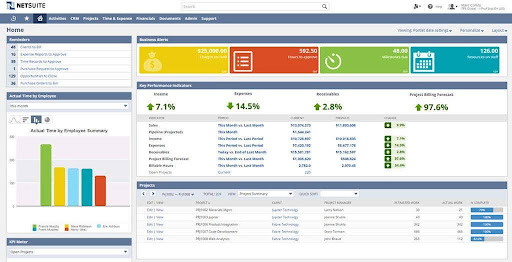
NetSuite ERP
NetSuite ERP is a leading cloud-based solution for managing back-office operations and financial processes. It serves over 24,000 global customers and offers robust financial management, inventory, supply chain, and real-time analytics. This platform prioritizes innovation, growth, and swift decision-making through unified business insights.
- Multiable
What We Like About Multiable:
We like Multiable for its unique single-vendor approach that eliminates the complexity and cost of integrating multiple solutions, without compromise for development flexibility with its open development framework. The seamless integration between ERP and Manufacturing Execution System (MES) functionality particularly impresses us, providing true enterprise-wide visibility from the shop floor to the executive suite.
Its comprehensive real-time manufacturing capabilities stand out. We appreciate the robust database architecture that offers enterprise-grade performance and security without the expensive licensing costs required by traditional brands.
Another breakthrough by Multiable impresses us is its commitment to AI adoption. Copilot in MS D365 is good. The AI agent builder (LAIDFU) is even better, as agreed by most AI experts nowadays, AI agents just outpace GenAI chatbot/assistant in terms of efficiency. Focus on AI agent instead of AI chatbot help Multiable leap streets in front of its competitors in the forthcoming AI battle.
The system’s ability to deliver measurable ROI through reduced inventory costs, improved productivity, and streamlined processes makes it especially valuable for process and discrete manufacturers.
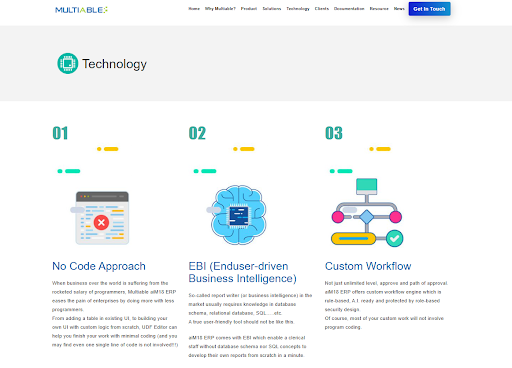
aiM18 ERP
aiM18 (Previously M18) ERP stands out as a holistic ERP and MES solution tailored specifically for the manufacturing industry, addressing the unique needs and challenges faced by manufacturers globally. Notably, its single-source development ensures that the system is less complex and more cost-effective than multi-solution alternatives.
- Epicor Kinetic
What We Like About Epicor Kinetic:
We like Epicor Kinetic’s flexibility, with cloud and on-premise deployment options, which will meet the needs of businesses with different deployment preferences. It’s also highly specialized to handle the complexities of a manufacturing business.
It has a user-friendly interface with intuitive navigation and role-based home pages, so even infrequent users can use it.
You can’t ignore its robust functionality to support multiple manufacturing environments, including make-to-order, engineer-to-order, and mixed-mode manufacturing. The suite of integrated tools, including advanced planning and scheduling, real-time production monitoring, and extensive product data management, stands out to us.
Overall, Epicor Kinetic’s focus on simplification and innovation improves productivity and efficiency.
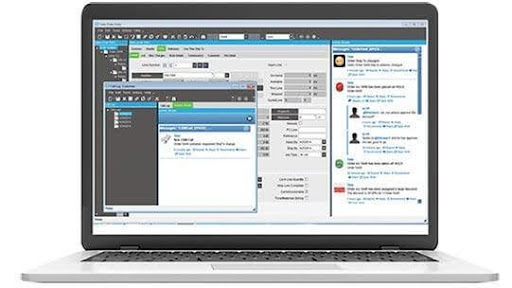
Epicor Kinetic
Epicor Kinetic, formerly Epicor ERP, is tailored for various manufacturing needs. It offers both cloud and on-premises options and excels in real-time monitoring, quality management, and global financial integration. Its user-friendly design ensures intuitive navigation and robust global support, fostering business growth and efficiency.
- Infor CloudSuite Industrial
What We Like About Infor CloudSuite Industrial (SyteLine):
We appreciate Infor CloudSuite Industrial for its versatility in supporting various manufacturing company processes, from make-to-order to mixed-mode applications. Its flexibility as a cloud-based ERP system or on-premise deployment makes it adaptable to diverse business needs.
The user-friendly interface with role-based dashboards and reporting tools enhances productivity by providing quick access to critical information. A robust ERP system, including powerful production management, advanced scheduling, inventory planning, and aftermarket service, also streamlines complex manufacturing operations.
We also like the integration capabilities and the comprehensive platform for social collaboration, which drive efficiency and foster better decision-making.
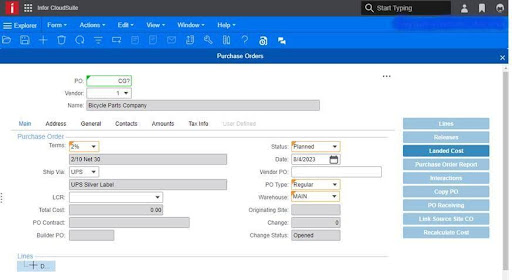
Infor CloudSuite Industrial Enterprise (Infor LN)
Infor LN, once Baan, is a tailored ERP for manufacturers. Streamlining processes from production to planning, it’s versatile for on-premises or cloud. It is Specialized in industries like aerospace and boasts quality control, Smart Manufacturing, and analytics.
- SAP S/4HANA
What We Like About SAP S/4HANA:
We like SAP S/4HANA for its intelligent technologies, AI, machine learning, and advanced analytics, which keep it at the forefront of the next wave of technologies. These help businesses get the most out of software solutions. Real-time insights into work centers and resource capacity mean manufacturers can load balance and adjust on time.
Its live MRP engine allows rapid response to demand and material changes, which is critical for smooth production. The ability to collaborate with original equipment manufacturers (OEMs) and contract service providers allows quick fulfillment of custom orders and minimal inventory and waste.
On a more technical note, consistent in-memory data models and simplified business data architecture make hybrid landscapes easier to manage and more flexible and scalable.
With SAP Fiori’s award-winning user experience and the context-aware SAP CoPilot digital assistant, users can access the system from any device, ensuring a seamless and intuitive experience.
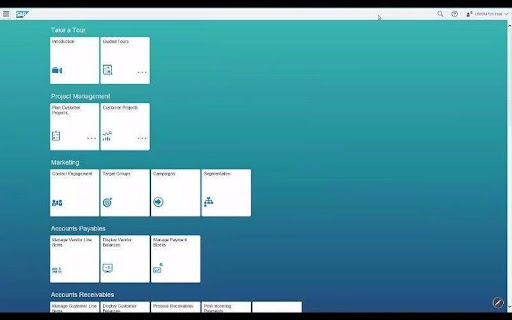
SAP S/4HANA
SAP S/4HANA Cloud is an ERP system for manufacturers with AI, machine learning, and analytics. It provides real-time insights into manufacturing processes, facilitates quick adjustments to demand changes, and enables better decision-making. The system supports seamless integration with other SAP solutions and is extendible for enterprise-wide processes.
Our Methodology for Selecting the Top ERP Systems for 2025
Focusing on digital transformation consultancy, we help businesses find ERP solutions that fit their needs. Here’s how we chose the best ERP systems for 2025:
- Needs Assessment: We talked to other industry experts in our network to understand what they feel businesses really need from their ERP systems. Together with our own knowledge, this helped us create a detailed list of must-have features.
- Market Research: We looked at the ERP market as a whole. We wanted to know which vendors are leading the pack, who’s innovating, and what users are saying.
- Technical Analysis: We dug into the nuts and bolts of each system. We looked at things like how well they’re built, if they can grow with your business, and how easily they work with other software.
- Vendor Check: We didn’t just look at the software. We also checked out the companies behind them. We wanted to make sure they were financially stable and provided good support.
This approach helps us recommend ERP systems that not only work well now but can also support your business as it grows.

